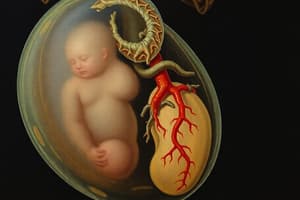Podcast
Questions and Answers
During organogenesis, organs and organ systems form between the third and eighth week of pregnancy.
During organogenesis, organs and organ systems form between the third and eighth week of pregnancy.
True (A)
The prenatal period consists of two main stages: the embryonic period and the fetal period.
The prenatal period consists of two main stages: the embryonic period and the fetal period.
False (B)
Gastrulation occurs during the first week of development.
Gastrulation occurs during the first week of development.
False (B)
Organogenesis involves the differentiation and migration of cells to form tissues and structures associated with organs.
Organogenesis involves the differentiation and migration of cells to form tissues and structures associated with organs.
The heart begins to beat by the fourth week of pregnancy.
The heart begins to beat by the fourth week of pregnancy.
The three primary germ layers formed during gastrulation are ectoderm, mesoderm, and endoderm.
The three primary germ layers formed during gastrulation are ectoderm, mesoderm, and endoderm.
Fetal movements begin by the twelfth week of pregnancy.
Fetal movements begin by the twelfth week of pregnancy.
The brain development process starts in the second trimester.
The brain development process starts in the second trimester.
The liver starts functioning by the end of the second trimester.
The liver starts functioning by the end of the second trimester.
Functional kidneys start producing urine in the third trimester.
Functional kidneys start producing urine in the third trimester.
Muscles layers appear through the intestines by week fourteen.
Muscles layers appear through the intestines by week fourteen.
Respiratory system development is complete by week thirty-two.
Respiratory system development is complete by week thirty-two.
Flashcards are hidden until you start studying
Study Notes
Fetal Development and Organogenesis
Introduction
Fetal development is the complex process by which a fertilized egg grows into a fully developed baby. It involves various stages of cell division, differentiation, and tissue development. Here, we focus on organogenesis, the phase of development where organs and organ systems form, which typically occurs between the third and eighth week of pregnancy.
Stages of Prenatal Development
The prenatal period consists of three main stages:
- Pre-embryonic stage: The first two weeks, marked by cell division and initial differentiation.
- Embryonic period: Lasting from the third to the eighth week, characterized by organ formation.
- Fetal period: From the ninth week till birth, marked by the growth of organs and tissues.
During the embryonic period, cells undergo differentiation and migration toward specific regions, eventually forming tissues and structures associated with organs.
Organogenesis and Organ Formation
Organogenesis refers to the development of organs and their specific features during the human embryonic period. Several key events characterize organogenesis:
First Trimester (Weeks 3-8)
In the third week of development, gastrulation occurs, leading to the formation of the three primary germ layers: ectoderm, mesoderm, and endoderm. Different parts of each system form from these layers.
Heart Development
By the sixth week of pregnancy, the heart begins to beat and can be detected by ultrasound.
Limb Buds
Limb buds start to form by the fourth week of embryonic development and develop throughout the first trimester.
Digestive Tube Differentiation
The digestive tube starts differentiating in the third week, initially forming as a hollow cylinder of endodermal cells surrounded by mesoderm.
Umbilical Cord
The umbilical cord forms and begins to transfer nutrients and oxygen from the mother's bloodstream to the fetus.
Second Trimester (Weeks 9-20)
Fetal Movements
Fetal movements begin by the ninth week, and by the twelfth week, the fetus can swallow amniotic fluid.
Brain Development
The neural tube closes by the fourth week, and brain development continues throughout the second trimester.
Liver Development
Although rudimentary from the beginning, the liver starts functioning by the end of the first trimester.
Kidney Development
Functional kidneys start producing urine in the second trimester, although they lack mature nephrons until the early third trimester.
Third Trimester (Weeks 21-32)
Muscle Development
Distinctive longitudinal and circular muscle layers appear through the intestines by week twelve, and muscularis mucosae develops by week fourteen.
Respiratory System Development
The respiratory system continues to develop, with fetal intestinal absorption reaching adult levels by week thirty-two.
Body Growth
Rapid growth of the fetus occurs during the third trimester, with fetal weight increasing significantly.
Conclusion
Understanding the stages of fetal development and organogenesis is crucial for monitoring normal growth and detecting abnormalities. Proper fetal development ensures the optimal health and survival of the baby after birth.
Studying That Suits You
Use AI to generate personalized quizzes and flashcards to suit your learning preferences.




